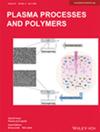Cold plasma treatment of patient‐derived chronic lymphocytic B‐cell leukemia enhances cytotoxic T‐cell proliferation
IF 2.9
3区 物理与天体物理
Q2 PHYSICS, APPLIED
引用次数: 0
Abstract
Cold physical plasma, a partially ionized gas, has been shown to be effective in treating chronic wounds and cancer. However, there is limited research on plasma exposure of leukemia cell lines, such as chronic lymphocytic leukemia (CLL) and cytotoxic CD8冷等离子体治疗患者源性慢性淋巴细胞 B 细胞白血病可增强细胞毒性 T 细胞增殖
冷物理等离子体是一种部分电离的气体,已被证明可有效治疗慢性伤口和癌症。然而,有关白血病细胞系(如慢性淋巴细胞白血病(CLL)和细胞毒性 CD8+ T 细胞)暴露于等离子体的研究却很有限。为了研究血浆源性活性氧的潜在促免疫效应,研究人员从 CLL 患者和健康志愿者身上分离出细胞毒性 T 细胞。在患病组和健康组中,广泛的冷血浆处理降低了 T 细胞的代谢活性和存活率。等离子处理共培养物(而非 CD8+ T 细胞单培养物)可刺激细胞毒性 T 细胞增殖,这可能是由于等离子增强了 CLL 抗原显示和等离子介导的免疫调节表面分子调节。要了解这些发现的机制和临床意义,还需要进一步的研究。
本文章由计算机程序翻译,如有差异,请以英文原文为准。
求助全文
约1分钟内获得全文
求助全文
来源期刊

Plasma Processes and Polymers
物理-高分子科学
CiteScore
6.60
自引率
11.40%
发文量
150
审稿时长
3 months
期刊介绍:
Plasma Processes & Polymers focuses on the interdisciplinary field of low temperature plasma science, covering both experimental and theoretical aspects of fundamental and applied research in materials science, physics, chemistry and engineering in the area of plasma sources and plasma-based treatments.
 求助内容:
求助内容: 应助结果提醒方式:
应助结果提醒方式:


